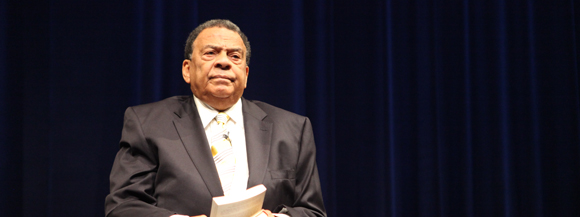On Oct. 11, Andrew Young, former mayor of Atlanta and noted civil rights activist, visited Tech to speak to students about his role in the civil rights movement and its respective legacies as a part of the Freshman Reading Project.
The former mayor of Atlanta and United States’ United Nations Ambassador was a prominent figure in the civil rights movement and one of only three surviving aides who was with Martin Luther King Jr. when he was assassinated in Memphis, Tennessee on April 4, 1968.
Not only was Young intrinsically involved in the passage of the Civil Rights Acts of 1964 and 1968, Young has a history of service to Georgia. He served as Ambassador to the United Nations under President Jimmy Carter, was elected to the U.S. House of Representatives and was the mayor of Atlanta for two terms.
“[Young is] a personal hero of mine,” said Gary May, Dean of the College of Engineering, during the introduction to the speech.
Young chose to sit as opposed to standing at a podium because he wanted his presentation to be more of a “conversation” rather than a speech.
The book, a collection of works by the late Dr. Martin Luther King Jr.
Young’s reading lecture, in which he discussed different parts of the freshmen reading book and spoke about his own beliefs, lasted approximately forty minutes and brought a diverse crowd of students, faculty, and alumni.
“I came to actually hear from someone who went through [the civil rights movement] instead of just reading about it,” said Owen Scott, a first-year ChBE major.
Similar to Scott, Betsy Kidwell, Director of HR and Finance for Student Affairs, came to the lecture to experience what one cannot find in textbooks.
“Young is a part of history,” Kidwell said.
The role that Young played in the historical non-violent protests headed by King and the greater civil rights movement in Georgia and around the countryw was a common theme for many in attendance.
“[Ambassador Young] did not read about history. He made history,” May said.
Despite this event being one of the many programs related to the celebration of the 50th anniversary of the peaceful integration of the Institute, Young did not speak only about race and integration. He also spoke on a range of topics including animal rights, poverty, war, education and diversity.
When asked whether Dr. King’s dream has been realized, Young asserted that Dr. King’s dream was to “redeem the soul of America from racism, war, and poverty.”
According to Young, legal racism is practically non-existent and current wars are less deadly than WWII and Vietnam. Poverty, however, is still a serious problem in today’s society.
“The lower middle class is moving down the ladder of success,” Young said.
Young’s solution to the poverty problem is closely linked to education. He believes that the two are intertwined.
“Poor should have access to education because in the long run an education presents a return on an investment,” Young said. He also added that it costs less to educate a person than to spend $40,000 a year to keep him in prison.
A member of the audience challenged Young’s view on access to education by stating that the market sees the poor as a risky investment, explaining why it is harder for impoverished people to obtain loans. Young responded by noting that the markets do not determine what is right.
“Markets are driven by profit, profit is driven by greed, and often greed is driven by stupidity,” Young said.
The audience burst into applause after this particular statement, though the audience applauded throughout the entirety of the evening.
After the event ended, Young participated in a book signing. He signed hundreds of copies of I Have a Dream: Writings and Speeches that Changed the World and took pictures with members of the Tech community.
Young reminded the audience to embrace diversity.
“Remember to appreciate and celebrate differences,” Young said.
